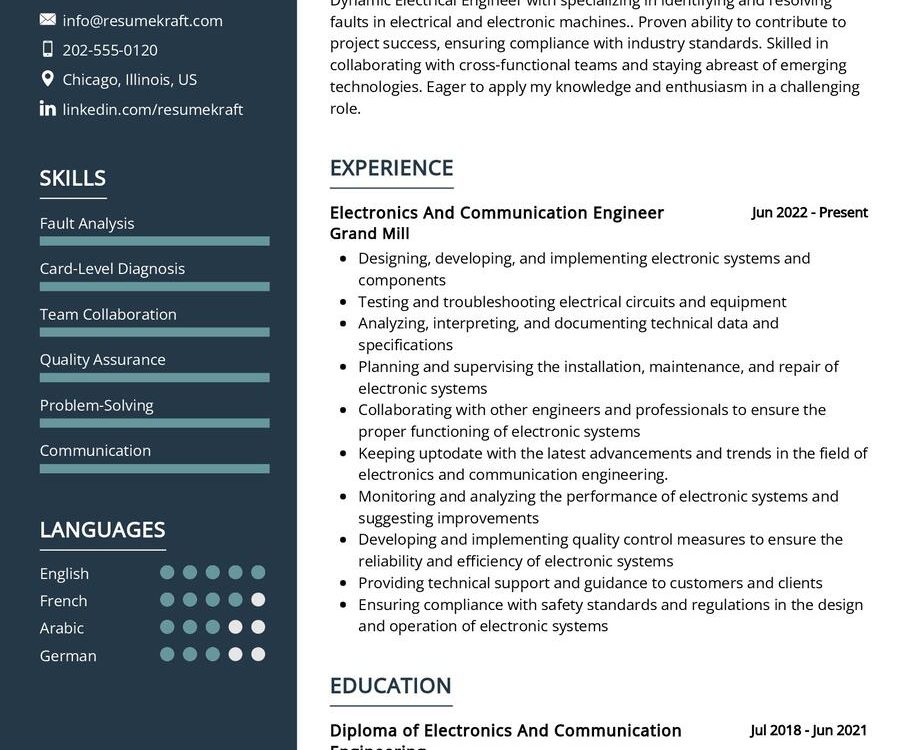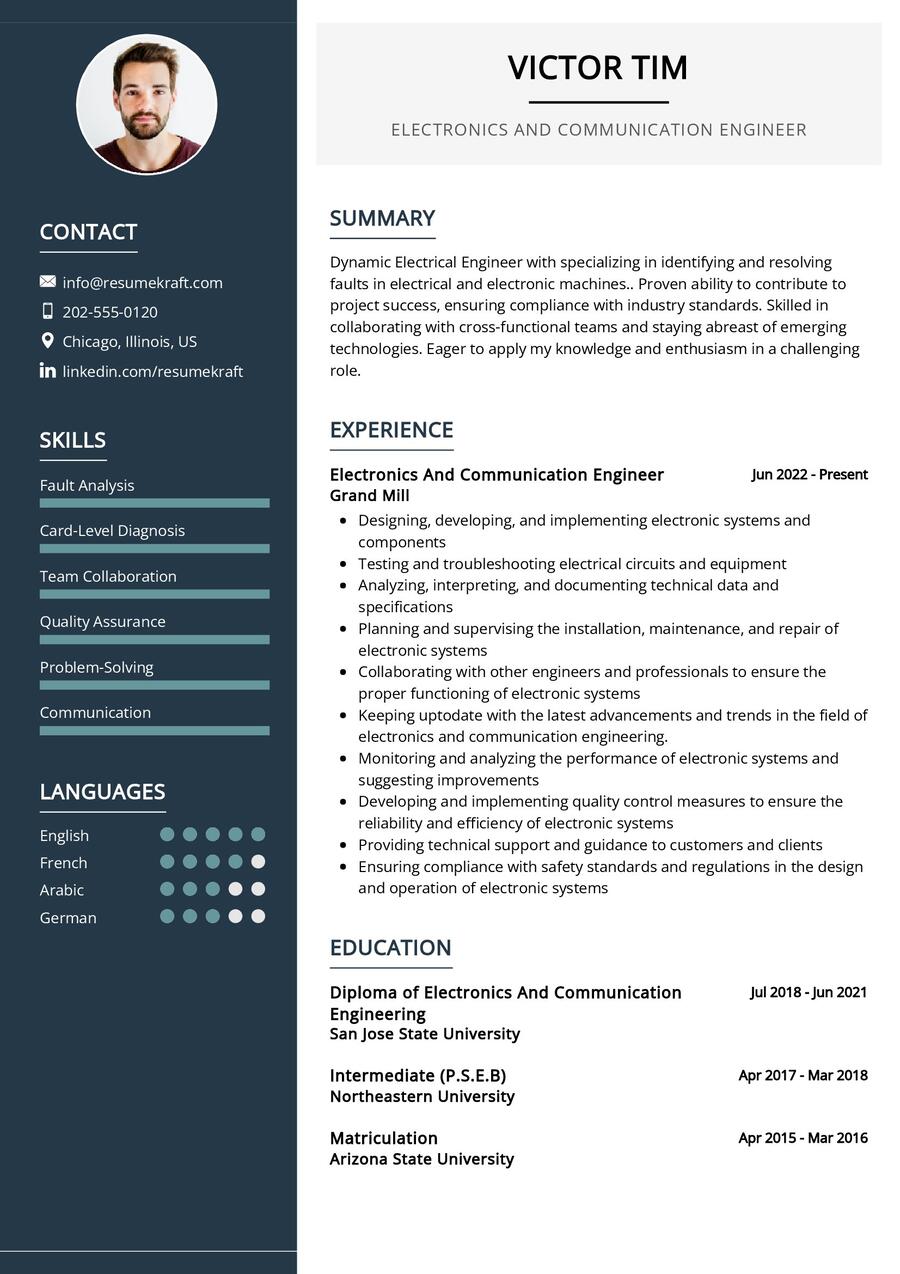The Crucial Role of an Electronics & Communication Engineer
As technology continues to advance, the role of an Electronics & Communication Engineer becomes increasingly integral to the functioning of modern society. This position requires a unique blend of technical expertise and problem-solving skills, making Electronics & Communication Engineers sought-after professionals in various industries. In this article, we’ll explore the multifaceted role of an Electronics & Communication Engineer, the key job requirements, responsibilities, and provide valuable tips for crafting a compelling CV for this dynamic field.
Job Requirements for an Electronics & Communication Engineer
Becoming an Electronics & Communication Engineer involves meeting specific educational and skill-based requirements. Here’s a detailed look at what it takes to thrive in this role:
- A Bachelor’s or Master’s degree in Electronics Engineering, Communication Engineering, or a related field, showcasing a strong foundation in the technical domain.
- Proficient knowledge of electronics components, circuits, and communication systems, with the ability to apply theoretical concepts to practical solutions.
- Hands-on experience in designing, testing, and troubleshooting electronic systems, demonstrating a trajectory of increasing responsibility in engineering roles.
- Strong analytical and problem-solving skills, essential for identifying and resolving complex issues in electronic and communication systems.
- Excellent communication skills, both written and verbal, to convey technical information effectively to team members and stakeholders.
- Knowledge of industry standards and regulations, ensuring compliance with safety and quality standards in electronic design and communication technologies.
- Proficiency in programming languages such as C, C++, or Python, depending on the specific requirements of the engineering projects.
Acquiring additional certifications in relevant technologies can enhance your profile and competitiveness in the job market.
Responsibilities of an Electronics & Communication Engineer
The role of an Electronics & Communication Engineer is diverse, encompassing a range of responsibilities that contribute to the successful design and implementation of electronic systems. Here are the key responsibilities associated with this role:
- Designing and developing electronic circuits and communication systems based on project requirements.
- Conducting feasibility studies and risk assessments to evaluate the viability of proposed electronic designs.
- Testing and troubleshooting electronic components and systems to ensure optimal performance and reliability.
- Collaborating with cross-functional teams, including software engineers and project managers, to integrate electronic systems into larger projects.
- Staying updated on industry trends and emerging technologies to incorporate innovative solutions into electronic design projects.
- Providing technical support and guidance to junior engineers and team members.
- Ensuring compliance with industry standards, safety regulations, and quality assurance processes throughout the engineering lifecycle.
Each responsibility requires a combination of technical expertise, teamwork, and problem-solving skills, making Electronics & Communication Engineers pivotal contributors to project success.
CV Writing Tips for Electronics & Communication Engineers
Your CV is the gateway to opportunities in the competitive field of Electronics & Communication Engineering. Here are some tips to create a CV that stands out:
- Highlight your educational background and any specializations or projects that showcase your expertise in electronics and communication.
- Detail specific achievements in your previous roles, quantifying your impact where possible.
- Showcase your hands-on experience with electronic design tools, testing equipment, and programming languages.
- Include any relevant certifications, emphasizing your commitment to continuous learning in the ever-evolving field of electronics.
- Customize your CV for each application, aligning your skills and experiences with the specific requirements of the job.
Your CV is not just a document; it’s a reflection of your skills, experiences, and potential as an Electronics & Communication Engineer.
CV Summary Examples for Electronics & Communication Engineers
Your CV summary is a concise overview of your professional journey. Craft a compelling summary that showcases your unique strengths and experiences:
- “Passionate Electronics & Communication Engineer with a Master’s degree and a proven track record in designing innovative electronic systems.”
- “Results-driven professional with hands-on experience in communication system optimization, contributing to a 15% improvement in project efficiency.”
- “Experienced Electronics & Communication Engineer adept at collaborating with cross-functional teams, ensuring seamless integration of electronic solutions.”
Your CV summary sets the tone for the rest of your CV, providing recruiters with a quick snapshot of your skills and achievements.
Building a Strong Experience Section for Your Electronics & Communication Engineer CV
The experience section of your CV is where you can delve into the details of your career journey. Use this section to narrate your achievements and contributions in previous roles:
- “Led a team in the successful design and implementation of a communication system, resulting in improved data transfer speeds by 25%.”
- “Contributed to the development of a novel electronic circuit, reducing production costs by optimizing component selection.”
- “Provided mentorship to junior engineers, fostering a collaborative and knowledge-sharing work environment.”
Your experience section is a narrative of your career, emphasizing your impact and growth as an Electronics & Communication Engineer.
Educational Section for Your Electronics & Communication Engineer CV
Your education is the foundation of your expertise as an Electronics & Communication Engineer. Clearly outline your educational milestones in your CV:
- Master of Science in Electronics Engineering, XYZ University, 2018.
- Bachelor of Technology in Communication Engineering, ABC University, 2014.
- Certification in Embedded Systems Design, Institute of Electronics and Telecommunication Engineers, 2015.
Your educational qualifications serve as a testament to your knowledge and commitment to the field.
Skills Essential for Your Electronics & Communication Engineer CV
Your skill set is your toolkit, showcasing your abilities as an Electronics & Communication Engineer. Here are the key skills you should include in your CV:
Soft Skills:
- Effective communication, conveying technical information to diverse audiences.
- Problem-solving abilities, identifying and resolving challenges in electronic design and communication systems.
- Team collaboration, working seamlessly with cross-functional teams to achieve project goals.
- Attention to detail, ensuring precision in electronic circuit design and system implementation.
- Adaptability, staying current with evolving technologies and industry trends.
Hard Skills:
- Proficiency in electronic design tools such as Altium Designer or Cadence Allegro.
- Knowledge of programming languages, including C and Python, for embedded systems development.
- Experience with testing equipment, oscilloscopes, and spectrum analyzers.
- Familiarity with communication protocols such as TCP/IP and UDP.
- Understanding of industry standards and regulations in electronics and communication engineering.
Each skill in your toolkit contributes to your effectiveness as an Electronics & Communication Engineer.
Common Mistakes to Avoid in Your Electronics & Communication Engineer CV
When crafting your CV, be mindful of common mistakes that can hinder your chances of landing your dream job. Here are pitfalls to avoid:
- Avoid using a generic CV for every application; tailor your CV to match the specific requirements of each job.
- Instead of listing job duties, focus on showcasing your achievements and the impact you’ve made in previous roles.
- Don’t underestimate the importance of a cover letter; use it as an opportunity to tell your story and connect with potential employers.
- While technical jargon is essential, balance it with clear explanations to ensure your value shines through.
- Always proofread your CV to maintain a professional image and avoid errors that could cost you opportunities.
Avoiding these mistakes ensures your CV is both authentic and compelling, increasing your chances of standing out in the competitive job market.
Key Takeaways for Your Electronics & Communication Engineer CV
As you conclude this comprehensive guide, remember these key points to craft an impactful Electronics & Communication Engineer CV:
- Emphasize your educational background and specialization in electronics and communication.
- Showcase specific achievements in your previous roles, quantifying your impact for added emphasis.
- Highlight your hands-on experience with electronic design tools, testing equipment, and programming languages.
- Include relevant certifications to demonstrate your commitment to continuous learning.
Finally, feel free to utilize resources like AI CV Builder, CV Design, CV Samples, CV Examples, CV Skills, CV Help, CV Synonyms, and Job Responsibilities to create a standout application and prepare for the Electronics & Communication Engineer job interview.
Armed with these insights and tips, you are now ready to craft a CV that is a true reflection of your journey, your skills, and your aspirations. Remember, your CV is not just a document; it is a canvas where you paint your career story, a story of growth, learning, and success. Best of luck!


